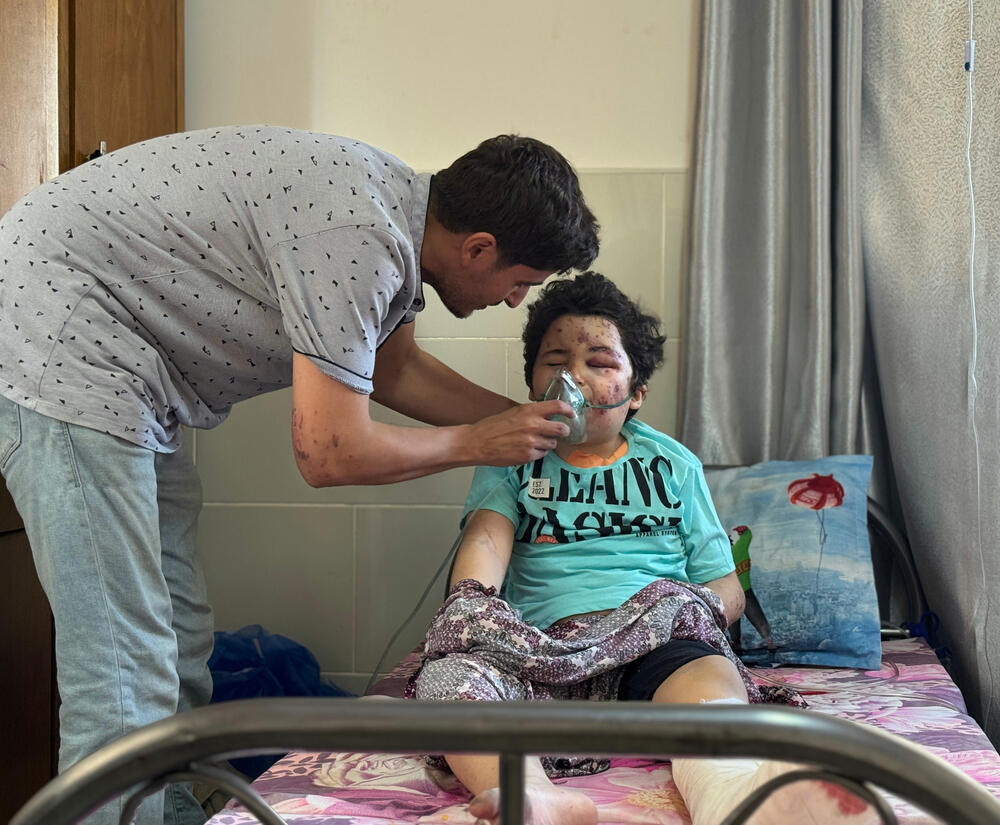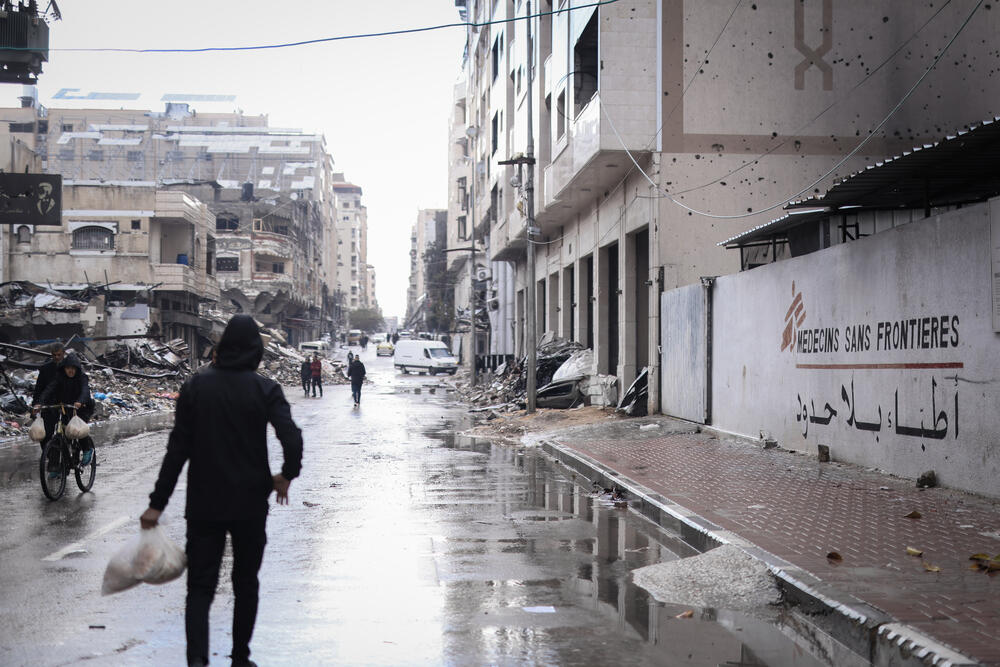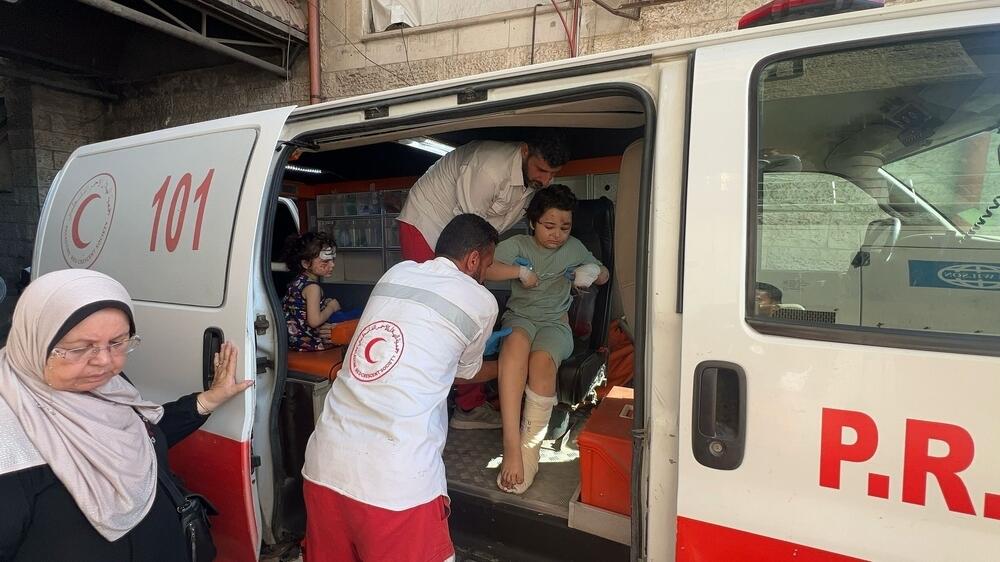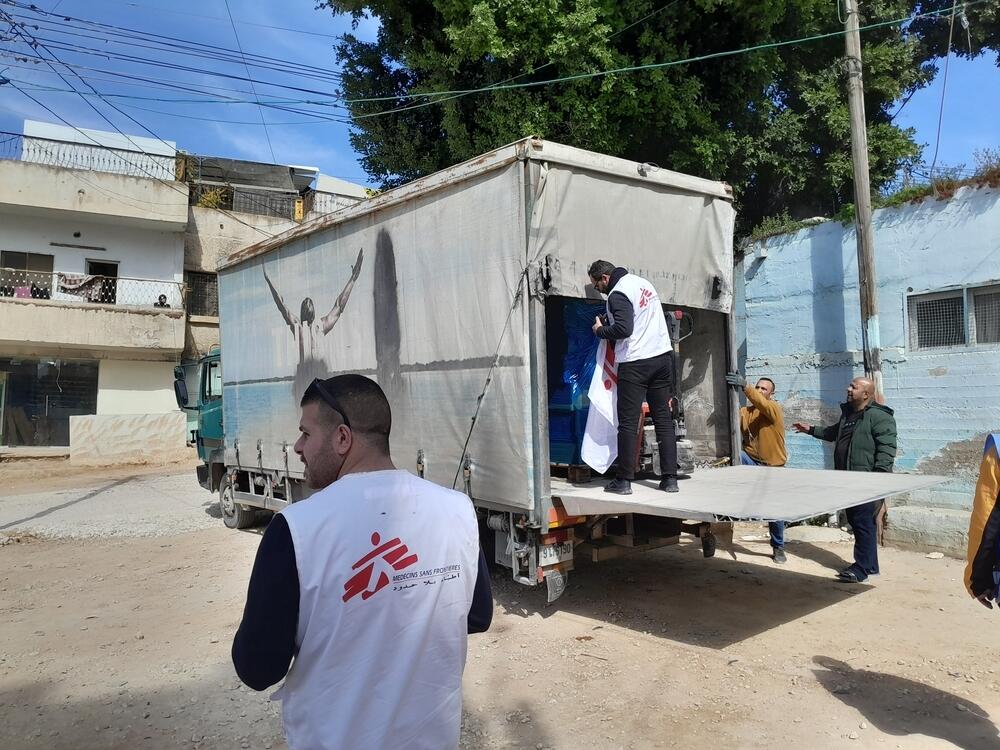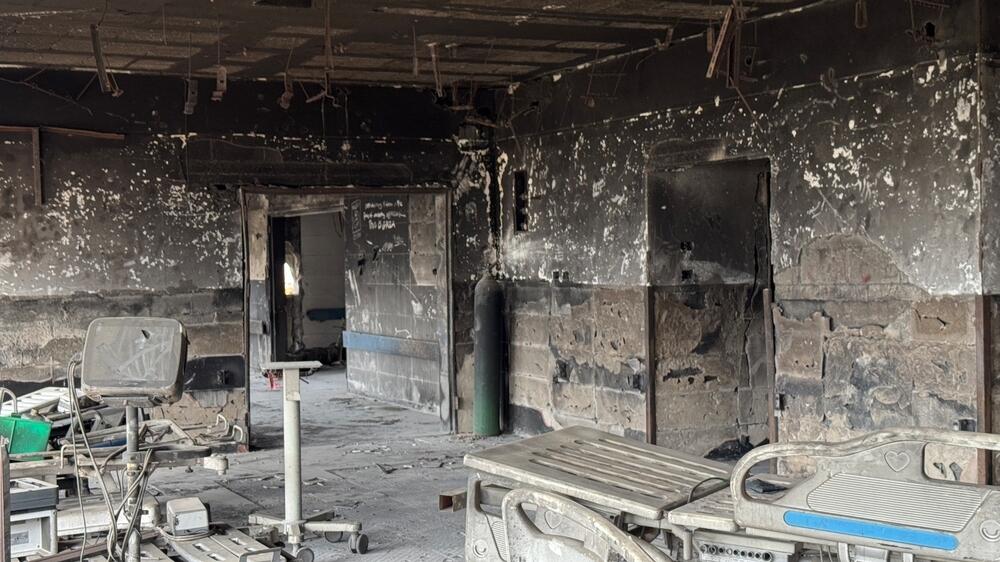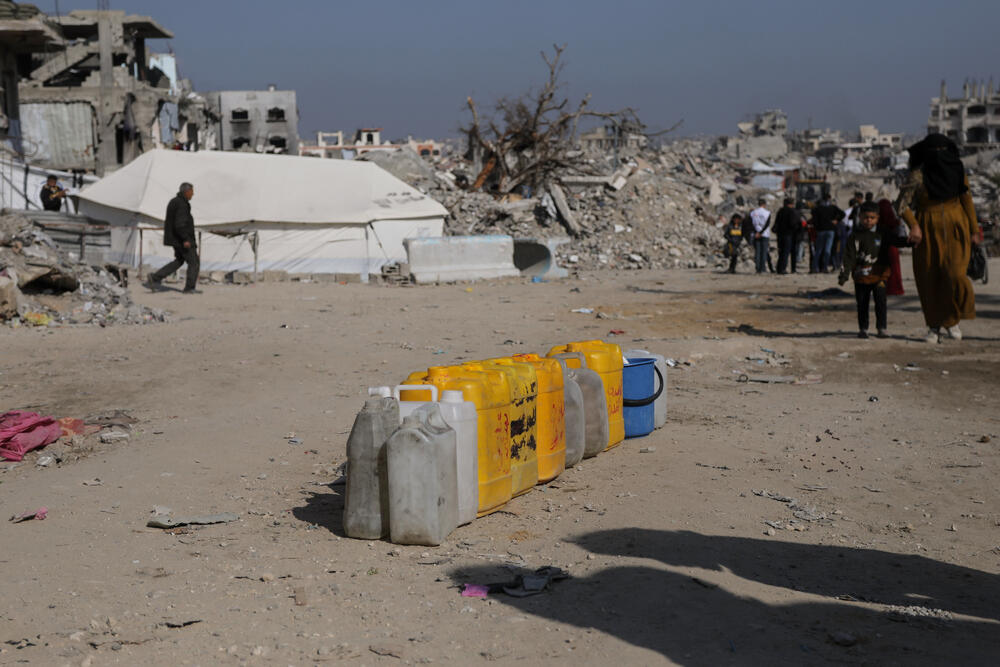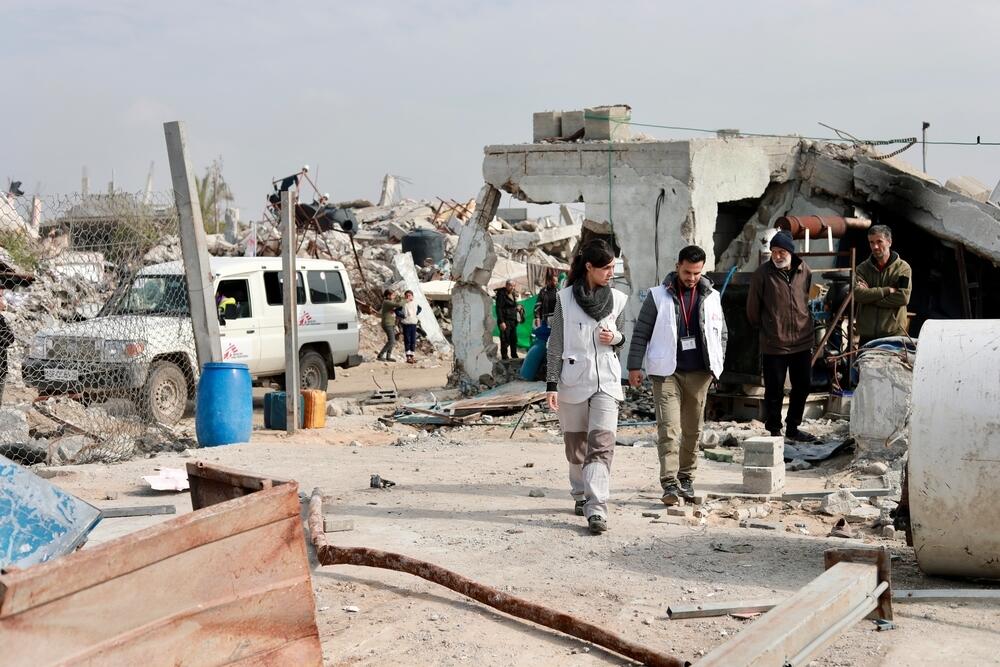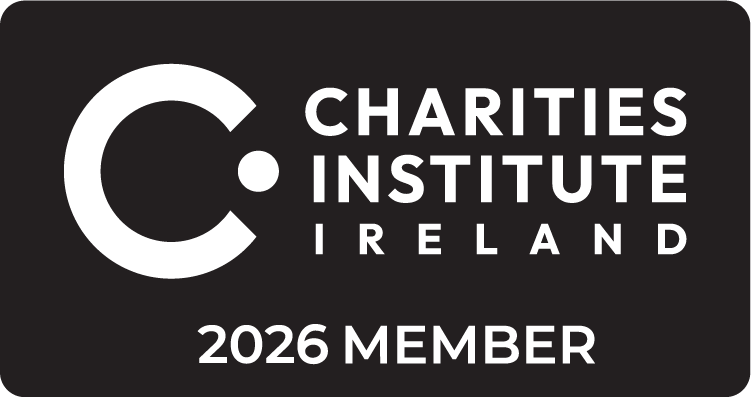Gaza genocide: How MSF is responding
Latest update: 10 February 2026
Despite the ceasefire agreement which came into effect on 10 October 2025, Israeli forces continue to kill and injure Palestinians - including children - with drones, airstrikes and shootings.
An agreement does not undo the immense suffering experienced by so many. Two years of catastrophic violence have left deep scars. More than 70,000 people have lost their lives during this genocide, including 15 of our own MSF colleagues.
Families displaced from their homes on multiple occasions are now experiencing another devastation: returning to find nothing left, their homes and sometimes whole neighbourhoods razed to the ground.
Israel is now taking steps to stop the work of MSF and other NGOs in Gaza and the West Bank, by threatening to withhold registration.
Here we address questions and allegations about MSF's work in Gaza >
Donate to the Gaza Emergency Regional Fund
Help provide vital medical care to those who need it most.
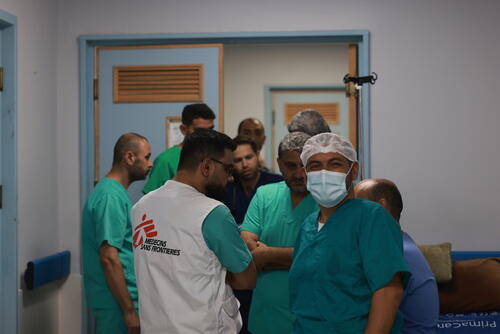
Gaza lies in ruins. Since October 2023 more than 67,000 Palestinians have been killed and more than 169,000 wounded. Some 44,000 children have been orphaned. People have been trapped in an endless cycle of displacement and mental distress, fleeing from one part of the Strip to another due to Israeli forces’ evacuation orders. Hundreds of health and humanitarian workers have been killed, including 15 of our own Médecins Sans Frontières/Doctors Without Borders (MSF) colleagues. It will take decades to rebuild and recover, and for many Palestinians, the physical and emotional wounds will last a lifetime.
Latest MSF Updates from Gaza and West Bank:



Between 7 October 2023 and 22 November 2025, MSF teams in Gaza have provided:
- 1,446,081 Outpatient consultations
- 499,758 Emergency presentations
- 88,474 People treated for diarrhoea
- 20,444 Surgical interventions
- 72,529 Inpatients admitted
- 77,954 Ante-natal consultations
- 19,500 Deliveries
- 83,583 Individual mental health consultations
- 107,516 Non-communicable disease consultations
MSF is calling on:
- Ireland, the EU and its member states to take concrete actions to use every political, economic, and diplomatic tool at their disposal to end the genocidal war in Gaza and ensure unhindered humanitarian access to Gaza.
- Israel to respect International Humanitarian Law and stop the deliberate destruction of Gaza’s healthcare system.
- Israeli authorities to lift the siege and allow the unimpeded flow of food, fuel, medical and humanitarian supplies to flow unimpeded into the Strip, the dismantlement of the Gaza Humanitarian Foundation and return to the regular UN aid system in Gaza.
Key Information:
We currently have over 1,390 staff members in Gaza and 250 in the West Bank.
The majority of our Gaza team are Palestinian and many have now lost homes or family members in the violence. Throughout the war, MSF staff have been working at hospitals and clinics, providing essential medical aid that includes:
• Surgical care
• Wound and burn care
• Maternity care
• Physiotherapy
• Mental health support
• Vaccinations
• Outpatient consultations
Hospitals and clinics that we currently support or have previously supported include:
• Southern Gaza: Nasser Hospital plus the Al-Mawasi, Khan Younis and Al-Attar healthcare centres and the Al-Quarara clinic
(Previously European Gaza Hospital, Rafah Indonesian Field Hospital, Al-Emirati Maternity Hospital and Martyrs and Beni Suhaila clinics)
• Middle Area: Al-Aqsa Hospital and two field hospitals, plus the Al-Martyrs and Al-Hekker healthcare centres
• Northern Gaza: MSF Gaza City clinic
(Previously Al-Shifa Hospital and Al-Awda Hospital)
MSF teams have been working in Palestine since 1989, providing trauma care, mental health services and running a specialist reconstructive surgery project.
MSF’s activities in the West Bank have been affected by the escalation of violence and movement restrictions that have limited people’s access to essential services, including healthcare. The impact on our patients' mental health has been a particular concern.
We have responded by expanding our work to reach communities directly, help local emergency services and support healthcare centres and clinics.
In Nablus, MSF provides psychological therapy and sexual and gender-based violence services. We also train first responders from the Palestine Red Crescent Society.
In Jenin and Tulkarem, we train paramedics and volunteers to respond to medical emergencies inside the nearby refugee camps when ambulances are unable to reach patients due to violent incursions.
MSF is an impartial organisation. So, we are sometimes asked why we do not currently run medical programmes in Israel.
We have offered our support to Israeli hospitals treating high numbers of casualties. However, Israel has strong emergency and health systems in place.
MSF focuses on filling gaps in healthcare and going wherever that need is greatest. Our teams are working in Gaza and the West Bank – as we have for 20 years – providing medical aid and supporting a healthcare system that urgently lacks both staff and supplies.
This is why we report on what our staff and patients are directly witnessing and experiencing in Gaza. Hospitals are becoming overwhelmed and facing shortages of drugs, medical supplies, and fuel for generators.
The health system is continuously under attack in Gaza. Hospitals and ambulances are under attack, patients and medical staff are being injured and killed. The access to the wounded and sick is impeded by insecurity, lack of fuel and cell phone connectivity.
Most of Gaza’s hospitals are out of service as the electrical power and water have been cut off due to lack of fuel and also to the damage healthcare facilities sustained in multiple attacks. While some hospitals are closed, the others function with very limited resources, often unable to admit new patients due to lack or absence of medical supplies and medication, fuel, food and water. Medical staff working in Gaza are utterly exhausted and do what they can in impossible conditions.
Throughout the war in Gaza, MSF teams have witnessed attacks on health facilities in the Gaza Strip, including raids on hospitals, sieges and the destruction of medical infrastructure and equipment. On several occasions, our teams have also witnessed the detention of medical staff and patients. The healthcare system in Gaza has practically collapsed, while, people’s medical needs are skyrocketing.
Medical staff should not have to choose between saving their own lives and those of their patients.
Staff and patients from MSF have had to leave 14 different health structures and have endured 26 violent incidents (3.7 per month on average), which includes airstrikes damaging hospitals, tanks being fired at agreed deconflicted shelters, ground offensives into medical centres, and convoys fired upon. These attacks show the blatant disregard of medical humanitarian action and failure of deconfliction measures in a war fought with no rules.
Contrary to the repeated public communications of the Israeli authorities, humanitarian aid has been denied or severely impeded since the beginning of the war, making it near impossible to provide even basic healthcare. This is not a logistics problem; it is a political problem.
Instrumentalising aid to falsely create an illusion of safety and minimal service provision in Gaza, in order to maintain the pretence of Israel’s adherence to International Humanitarian Law, is pure propaganda and is only endangering civilians further. Aid, when it is not completely blocked, comes in dribs and drabs, and can in no way adequately meet the immense needs of people in Gaza.
Water supply is critical throughout Gaza. Due to a lack of fuel, desalination plants are operating at a reduced level. There is more imported food available in some markets, where it gets through in private company trucks, but it is unaffordable for most Gazans as prices of basic commodities have skyrocketed.
Northern Gaza remains isolated, receiving negligible amounts of humanitarian aid in contrast to the actual needs. OCHA said in June that the Israeli authorities had facilitated only 49% of the planned humanitarian assistance missions to northern Gaza. The rest were impeded, denied access, or cancelled due to logistical, operational or security reasons.
MSF visits to northern Gaza have illustrated the absence of essential supplies, clear and safe supply routes, and the devastation of numerous hospitals. The recent MSF report denounces Gaza’s “silent killings” from preventable diseases and lack of access to medical care
However, it’s important to note that some medical staff in hospitals like Indonesian hospital and Al Awda hospital continue working to rebuild, refurbish and treat patients. Distribution of aid within the strip from the North to the South and from the South to the North is near impossible.
Border restrictions and the limited options for crossing into Gaza have made our supply operations extremely difficult. Israeli authorities imposed a full siege—the longest since the beginning of the war—blocking all aid and depriving Palestinians of essential services and the basic necessities of life, including access to water.
Access to safe, clean drinking water is particularly difficult in Gaza, exacerbating living conditions, hygiene and health issues.
In the first year of the war, MSF delivered 636 tons of logistics and medical equipment (around 130 trucks). This included medicines, wound dressings, surgical kits, generators and two field hospitals.
The conditions in Gaza are only getting worse: more people are injured and dying every day, while medical care is becoming less and less available. Contributions towards the Gaza Emergency Regional Fund will support MSF’s emergency response to this severe humanitarian crisis. MSF’s independence — and your support — will be crucial to our ability to launch lifesaving programs assisting vulnerable people caught in the Gaza emergency.
How can I help MSF in Gaza
Right now, our teams in Gaza are treating patients injured or affected by the conflict. This is only possible because of donations from people like you.
Your donation will support our medical work in Gaza and in current conflicts in the Middle East, including the West Bank and Lebanon.
Please donate today to support our emergency teams.
